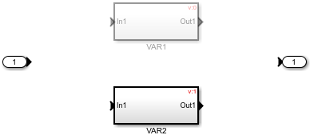Export Variation Points for AUTOSAR Calibration Data
You can export variation points for AUTOSAR calibration data, including:
Parameters — Calibration, shared internal, instance-specific, or constant memory
Per-instance memory — C- typed or AR-typed
Inter-runnable variables (IRVs) — Implicit or explicit
You can model calibration data in combination with different types of variant conditions. Model the variant conditions by using Variant Source and Variant Sink blocks, Variant Subsystem blocks. When you build your model, the exported AUTOSAR XML (ARXML) files contain the conditionally used data elements and their variation points.
For example, suppose that you open an AUTOSAR component model containing a Variant Subsystem block, which models two variant implementations of a subsystem, VAR1 and VAR2.


In VAR1, which is enabled when rainSensor == 1, you define a
parameter named scale and reference it in a block. When you build the
model, the exported ARXML contains a variation point description for the parameter. In
the variation point SHORT-LABEL, the parameter name is prefixed with
vp. In this example, the description indicates that the
scale parameter is used when variant condition
rainSensor == 1 is true.
<VARIATION-POINT>
<SHORT-LABEL>vpscale</SHORT-LABEL>
<SW-SYSCOND BINDING-TIME="PRE-COMPILE-TIME"><SYSC-REF DEST="SW-SYSTEMCONST">
/vss_pkg/vss_dt/SystemConstants/rainSensor</SYSC-REF> == 1</SW-SYSCOND>
</VARIATION-POINT>See Also
Variant Sink | Variant Source | Variant Subsystem